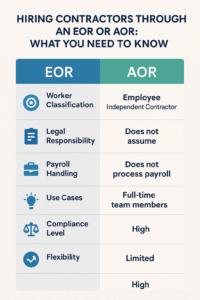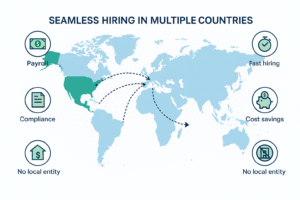
Introduction: Why Recommendation Letters Matter for Job Seekers
A great letter of recommendation can be the “secret weapon” in your job hunt. Even if employers don’t explicitly ask for one, having a strong recommendation letter in hand can set you apart from other candidates. These letters provide third-party validation of your skills and character – something a resume or interview can’t fully capture. In fact, an effective recommendation letter can differentiate you from other candidates and increase your chances of being hired. Beyond impressing hiring managers, reading a glowing endorsement of your work can also boost your confidence during a challenging job search.
However, getting a strong letter requires strategy. You’ll need to pick the right people, ask in the right way, and support your recommenders so they can write a detailed, positive letter. Below, we break down a step-by-step approach for job seekers to secure recommendation letters that truly get results.
Step-by-Step: How to Ask for a Letter of Recommendation
- Choose the Right Recommenders: Identify 2–3 people who can speak highly of your work ethic, skills, and accomplishments. Ideally, these are former managers or supervisors who have witnessed you excel in your role. You might also consider senior colleagues, mentors, or professors (if you’re a recent grad) who know your capabilities well. Avoid overly personal references (like family or friends) – employers may view them as biased. It’s better to have someone who can provide specific examples of your achievements. Also, think about variety: if possible, ask people from different contexts (e.g. a manager and a client) to give a well-rounded picture of you.
- Ask Politely – and Ideally In Person: When it comes time to ask, timing and tone are everything. If feasible, request the recommendation in person or via a video call, especially if you see the person regularlythemuse.com. A face-to-face request feels more personal and respectful. Start by expressing appreciation: for example, “I’ve really valued your mentorship and what I’ve learned under your supervision.” Then explain what you’re applying for and why you thought of them to recommend you. Tara Padua, a career coach, suggests using a little bit of flattery – mention why you admire them and value their opinionthemuse.com. Importantly, give them an out: phrase your request in a way that allows them to decline gracefully if they’re not comfortable (e.g. “Would you feel comfortable writing a letter of recommendation for me?”). If they hesitate or decline, respond graciously – thank them for considering itindeed.com and move to another choice on your list. If an in-person ask isn’t possible: It’s fine to request via email or phone. In that case, start with a warm greeting and a sentence about why you’re reaching out (for example, “I’m applying for X position and I’m gathering a few recommendation letters…”). We’ll provide a template email in a moment. Just remember to still personalize it and be courteous.
- Provide Context and Materials to Make It Easy: Once someone agrees to write a letter, set them up for success. Supply any information that can help them write a detailed letter. This can include: an updated resume (so they can see all your skills and accomplishments), the job description of the role you’re applying for, and a short list of key achievements or projects you had while working with them. You might gently remind them of specific successes – for example, “Attached is my resume and a quick summary of the project where our team exceeded targets by 15% last year, which you mentored me through.” The easier you make it for your recommender, the more likely you’ll get a glowing, detailed letter. As one expert puts it, “Make it easy for the person to recommend you… tell them specifically what you would like to highlight.”themuse.com Providing these materials jogs their memory and helps them tailor the letter to the opportunity at hand.
- Timing Is Key – Ask Early and Set a Realistic Deadline: Never wait until the last minute to request a recommendation. Remember, you’re asking for a favor that takes time and thought. Ask at least two weeks before you actually need the letter (and a month in advance is even better in many cases)indeed.com. This buffer gives your writer ample time to fit it into their schedule. When they agree to write the letter, politely communicate your deadline: for example, “The application is due April 30, so if possible, I would need the letter by April 25.” Being clear about timing (and the submission method, whether you need a PDF emailed to you, a form submitted online, etc.) is important. Also, consider when you ask: if you know your internship ends in August and you’ll be job hunting in the fall, ask in August while your work is still fresh in their mind. If you’re wrapping up a job, that transition moment can be a good time to ask for a general recommendation letter for your portfolio.
- Follow Up Gently and Express Gratitude: It’s smart to send a friendly reminder as the deadline approaches if you haven’t received the letter yet. A good rule of thumb is to follow up about 3–4 days before the due datethemuse.com. Something like, “Just wanted to touch base about the recommendation letter – please let me know if you need any additional info. I really appreciate your help and don’t want to rush you; I just have to submit everything by Friday.” In most cases, people don’t mind a polite nudge. After the letter is done, send a sincere thank-you note (email is okay, but a handwritten note can leave a great impression)indeed.com. Let them know how much you appreciate their support. And later, it’s a lovely touch to update your recommender on the outcome of your applicationindeed.com – for example, if you got the job or made it to final rounds. Not only is it courteous, it keeps your professional relationship positive. Remember, you may cross paths in the future or need their help again.
Email Template: Requesting a Letter of Recommendation
While asking in person is often best, you’ll likely formalize the request via email – or you may have to reach out by email from the start. Below is a simple email template you can use (feel free to adjust the tone based on your relationship):
Subject: Request for Letter of Recommendation
Dear [Professor/Dr./Mr./Ms. LastName],
I hope you’re doing well. I’m reaching out because I’m in the process of applying for [position] at [Company Name]. As part of my application, I’m gathering a few letters of recommendation, and I would be honored if you would write one for me.
We worked together on [project or context of your relationship] at [Company/School] for [duration]. I really valued your guidance during that time and I believe you can speak to [mention a couple of skills or qualities, e.g., “my growth as a marketer and my teamwork skills”].
I’ve attached my current resume and a brief outline of the position’s requirements for your reference. If you need any additional information to make this easier, please let me know – I’m happy to help. The deadline for submitting the letter is [date], so I wanted to give you as much advance notice as possible.
Thank you very much for considering this request. I know your endorsement would greatly strengthen my application. Please let me know if you’d be comfortable writing a recommendation letter for me, and feel free to reach out with any questions.Sincerely,
[Your Name]
[Your phone number (optional)]
This template hits the key points: it politely asks for the favor, reminds them of your connection, gives context for the request, and offers helpful info. Customize it! For example, if you’re asking a professor, you might mention the specific class or project you did with them. If it’s a former manager, maybe reference a successful project you worked on together. The more personal and specific you can make your request, the easier you make their job of writing the letter.
(Pro Tip: If you don’t hear back from an email request after a week, a courteous follow-up is perfectly fine. Something as simple as “Just wanted to check if you saw my earlier email about a recommendation letter – I completely understand you’re busy, so please let me know if this is possible whenever you get a chance. Thank you!” can prompt a response.)
FAQs: Letters of Recommendation for Job Applications
Q1: Who should I ask for a recommendation letter if I have limited work experience?
A: If you’re early in your career or a recent graduate without much work history, consider academic references (professors, academic advisors) or supervisors from internships, volunteer work, or part-time jobs. The key is someone who can speak to your qualities and achievements in a professional or academic settingindeed.com. For instance, a professor who saw you excel in coursework or a volunteer coordinator you reported to can be great substitutes for an employer reference. Avoid asking family members or friends – their praise won’t carry as much weight as a more objective perspectiveindeed.com. If you truly have no professional references, you might use a character reference from a community leader or mentor, but be sure they can highlight skills relevant to the jobs you’re pursuing.
Q2: How far in advance should I request a letter of recommendation?
A: As early as possible! A common guideline is at least 2–4 weeks before you need it, with more time (up to a couple of months) being ideal for busy professionalsindeed.com. People appreciate having ample time to write a thoughtful letter without last-minute pressure. If your application deadline is very close and you suddenly realize you need a letter, you can still ask – but acknowledge the tight timeline and be especially understanding if they can’t accommodate. And whenever you expect a future need (for example, you plan to apply to jobs or grad school in the coming months), it’s wise to plant the seed early by informing potential letter-writers of your plans.
Q3: What if a potential recommender seems hesitant or says no?
A: Don’t take it personally. There are many reasons someone might decline – perhaps they don’t have the time, or they feel they don’t know you well enough to write a strong letter. It’s actually a good thing if someone who can’t be fully positive declines; a lukewarm or generic letter won’t do you any favors. If you get a no (or a vague, hesitant response), thank them for their time and quickly move on to another option. This is why it’s smart to have a short list of multiple candidates for lettersindeed.comindeed.com. Also, consider whether you can help them feel more comfortable: maybe they’re unsure what to write, in which case offering more background info (or even a draft, if appropriate) could help. But never push someone who outright refuses – simply thank them and ask someone else.
Q4: Should I send the recommendation letter myself or have my recommender send it directly?
A: Follow the application instructions. Some employers (or schools) want the recommender to send letters directly (or upload to a portal) to ensure confidentiality. Others might ask for the letter as part of your application packet. If the choice is yours, it’s usually fine to send it yourself, but make sure the letter is signed (digitally or handwritten) by the recommender and on official letterhead if possible, to appear authentic. Always check if the employer prefers sealed envelopes or direct emails from references. When you ask someone to write the letter, let them know how it needs to be submitted so they can prepare it correctlyindeed.com.
Q5: Are letters of recommendation still useful if employers mostly call references?
A: Many hiring managers will indeed call your references or ask for reference contact info rather than letters. However, having a written letter can still be valuable. For one, you can offer it proactively in an interview or attach it to an application even if not required – it might impress them that you went the extra mile. Also, if a reference is hard to reach or the company’s policy is not to provide detailed references, a letter can fill that gap by giving a fuller picture of your backgroundthemuse.com. Certain industries and roles (and virtually all academic or scholarship applications) still rely heavily on formal recommendation letters. In any case, obtaining letters of recommendation helps you because your referees will have already articulated your strengths on paper – which often makes for better, more consistent verbal references too.
Q6: What should I do with a recommendation letter once I have it?
A: Congrats – you’ve got a great letter in hand! Treat it as a valuable asset. Keep both a digital copy (PDF) and a hard copy. You can use it in several ways: attach it to job applications that allow additional documents, bring a copy to interviews in case you’re asked for references (or simply to offer), and even upload it to your LinkedIn profile (there’s a section for media under each job entry where you could add it, or extract a key quote as a recommendation on LinkedIn). Just be mindful of confidentiality – if the letter is addressed “To Whom It May Concern” and given to you directly, it’s fine to use as you wish. If it was sent directly to an employer or is very specifically addressed, you might request a more general version for your own portfolio. Lastly, remember to update your letters periodically. If a letter is more than a couple of years old, consider asking for an updated one, especially if you’ve stayed in touch with the writer – your skills may have grown, and a fresh letter dated recently will carry more weight.
Conclusion: Proactive preparation pays off. Securing strong letters of recommendation requires effort and professionalism, but it can significantly boost your job search success. By choosing the right people and approaching them considerately, you’ll build a collection of endorsements that speak to your best qualities. These letters can reassure employers that you’re a proven asset – and sometimes, they even tip the scales in your favor when the competition is tough.
Need help crafting the perfect recommendation request or figuring out who to ask? Divino Business Solutions is here to support your career journey. We offer free email templates, checklists, and one-on-one coaching to help job seekers shine. Download our free “Recommendation Request Toolkit” today and let us help you take the next step toward landing that dream job!





